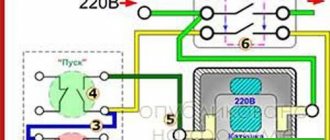The variety of electrical appliances in the modern world is amazing. Their development does not stand still; the consumption of electrical energy is growing every year. It is electricity that makes life easier for the housewife in the kitchen and allows her to spend the weekend watching TV. Electrical networks from which electrical equipment is powered require timely technical inspection, which helps prevent accidents on the line.
What can an electrician do?
Electrician
performs assembly and disassembly, adjustment and repair, maintenance of electric motors, generators, teleautomatic circuits and other electrical appliances. ... Conducts internal electrical networks in residential and industrial premises and performs their repairs.
Interesting materials:
What percentage of ultraviolet light does glass transmit? How long does Prusak live without water? How many springs are in the Multipack? How long is the Bluetooth range? How many times should I milk after calving? How many times should you feed laying hens? How many times can a goat give birth? How many times can you feed strawberries with yeast? How many times can you use an oak broom? How many times can you sow phacelia?
History of the profession
The profession of electrician appeared relatively recently. At the end of the nineteenth century, the first power plants began to appear and networks were laid. It was at this moment that the need arose for personnel who could service these stations. With the development of electrical networks and the construction of more and more new stations, there is a demand for specialists in the electrical power industry.
Currently, electricians are required in almost every enterprise. Organizations that service apartment buildings have an electrician on their staff who is responsible for intra-building networks. Due to the prevalence of the profession and the difficult work, quite high demands are placed on specialists.
Medical restrictions
The profession of an electrician has quite serious medical restrictions, since some health disorders can cause emergency situations. People with diseases of the musculoskeletal system, which can cause impaired coordination of movements, cannot be electricians. Also, people with visual impairments that cannot be corrected by glasses or lenses are not allowed to work. Disorders of the nervous system, some diseases of the heart and lungs can cause professional incompetence. The profession of an electrician also involves working at heights, so a sudden attack of asthma or epilepsy can cause an accident.
Who is it suitable for?
The specialty of an electrical engineer will be of interest primarily to men with a technical mindset, although women often perform just as well in the profession. What you will need to know in order to work effectively:
- laws, regulations and other documents related to the maintenance of electrical networks and equipment;
- rules for operation and scheduled repair of equipment, modes of operation, technical characteristics and design features;
- the procedure for drawing up estimates for repairs, as well as the purchase of electrical equipment and components;
- labor protection and fire safety rules;
- computer drawing programs (if the specialist is engaged in design).
As for personal qualities, the most important for an electrical engineer are developed logical thinking, responsibility, good memory, patience and caution, attention to detail, the ability to approach work systematically, the ability to quickly respond to emergency situations and make the right decisions, leadership qualities, readiness constantly improve your skills. The advantages of the profession include its high demand and good career prospects. Disadvantages - danger to health and life (risk of electrical injury), often irregular schedule, need to constantly monitor the development of technology
Disadvantages - danger to health and life (risk of electrical injury), often irregular schedules, the need to constantly monitor the development of technology
The advantages of the profession include its high demand and good career prospects. Disadvantages - danger to health and life (risk of electrical injury), often irregular schedule, the need to constantly monitor the development of technology.
Comparison of electrical safety groups
> > ContentsCertification for electrical safety (ES) is carried out to confirm the qualifications of personnel. Rank is a decisive factor in determining the level of complexity of tasks that a specialist can perform in production. Also, the presence of this competence determines the level of knowledge on the safe performance of tasks in production.
Safe organization of personnel work Dependence of work experience and category in electrical safety Rank in electrical safety Required experience, months Workers Trainees and trainees Without basic education Secondary education Secondary technical, Electrical engineering VOPTU Technical colleges, universities 3-4 levels.
accreditation technical VOII 72 hours of training Not standardizedIII3 in II gr.2 in II gr.1 in II gr.6 in II gr.3 in II gr.IV6 in III
Free question for lawyers online
If you find it difficult to formulate a question, call, a lawyer will help you: Free from mobile and landline Free multi-channel phone If you find it difficult to formulate a question, call a free multi-channel phone, a lawyer will help you Subscribe to notifications Mobile application We are on social media. networks
© 2000-2022 Legal social network 9111.ru *A response to a question within 5 minutes is guaranteed to the authors of VIP questions. Moscow Komsomolsky pr., 7 St. Petersburg emb.
R. Fontanki, 59 Ekaterinburg: Nizhny Novgorod: Rostov-on-Don: Kazan: Chelyabinsk: close
We assign the employee a qualification category
During qualifying exams, examinees perform qualifying (trial) work and demonstrate knowledge within the requirements of qualification characteristics and training programs. As trial work, those selected are those that correspond to certain parameters, the level of declared qualifications, production standards adopted at the enterprise, are characteristic of a given enterprise, do not exceed one shift in duration, etc. The commission includes a chairman (usually a deputy the head of the institution, organization, enterprise), secretary and members of the commission. The qualification commission includes representatives of the employer (workshop, site), trade union committee (workshop, site), employees of departments (industrial training, labor and wages, personnel, labor protection, heads of workshops, sites and foremen).
Why are qualification categories assigned to this group of workers? Categorization of these employees is carried out to more fully take into account in official salaries differences in skill levels, complexity and responsibility of the work performed, and to increase the interest of employees in the growth of professional skills and quality of work. The qualification category reflects the degree of actual qualification of the employee, his business qualities, and the ability to independently and creatively perform the assigned work.
Example 3. Let’s assume that the head of an organization ordered the HR department to hire a friend of his (a 3rd category mechanic). But in the staffing table there is only a vacancy for a 2nd category mechanic. How can a personnel employee hire him at a lower rank?
On what basis will such a reduction be made? How can one then restore its discharge? It's quite simple. An employee, being a 3rd category mechanic, can be hired for a vacancy as a 2nd category mechanic, but only with his consent (application from this worker). Restoration of the category is carried out in the manner established for the assignment of qualifications.
The issue of assigning or increasing a rank to a worker is considered by the qualification commission of the enterprise based on the worker’s application.
Salary and career growth
The ranks of electricians and the level of their professional skills determine the level of wages. The career growth of a specialist also depends on the rank. With an increase in rank to fourth, an electrician at an enterprise can apply for the position of foreman.
Remuneration also depends on the policy of the organization where the specialist works. In the case of working as an electrician privately, the payment is set by the specialist independently and depends on his professionalism and the level of complexity of the work he performs.
Responsibility
An engineer can be held accountable if he performs his duties untimely and poorly. He is also responsible for: compliance with the regulations, rules and charter of the company, not violating the current legislation of the country during the performance of duties and for causing material damage to the organization.
In some cases, he may be held accountable for disclosing confidential information and violating trade secrets. He can be punished for exceeding his powers and using them for personal gain. He is also responsible for providing deliberately incorrect or incomplete information to his management.
Responsibilities
At the beginning of their careers, electrical engineers are primarily involved in debugging, repairing, installing and adjusting electrical devices and electrical circuits. The professional standard of these specialists includes the installation and separation of panels in production, warehouse and commercial facilities, the installation of cables and other electrical communications, as well as other electrical installation work.
The position of a leading electrician or site manager requires a higher level of responsibility. A person holding such a position will have to work with energy companies, as well as monitor compliance with labor safety standards. This person has full responsibility for all equipment and devices included in the electrical network of the enterprise.
The highest level of the career ladder, the position of an electrical engineer, includes additional functionality. His job description includes:
- drawing up projects and diagrams for connecting generating electrical units to the DC network;
- connecting each user to the power grid;
- creation of internal and external electrical supply systems;
- supervision of projects and comprehensive supervision of them.
Training of electricians
The TKS contains the main tariff and qualification characteristics of the most common types of work belonging to this category. For example, a third-class electrician performs simple work. He must know the main types of fasteners and small structures; main brands of cables; installation of simple instruments and electrical devices, used electrified and pneumatic tools. An electrician of this category installs brackets and structures for magnetic starters, installs grounding networks, paints cables, and removes jute covering from cables.
After completing your studies at vocational schools or training centers, special commissions determine the level of your theoretical and practical knowledge. Depending on this level, you are assigned ranks for the first time. There are six ranks in total (the lowest rank is the first, the highest is the sixth). In a vocational school or training center, only the basics of the profession are acquired. Over time, production skills increase, qualifications improve, work brings great satisfaction, and earnings increase.
Electricians of higher ranks perform more complex work. For example, the scope of work performed by an electrician of the 5th category on cable networks includes the installation of end and connecting couplings of all types on cables with voltages up to 10 kV, and of the 6th category - over 10 kV. An electrician of the 5th category for power networks and electrical equipment marks installation sites and installs ballasts, signaling equipment and instruments, points, panels, remote controls, traffic lights, rheostats, regulators, controllers, limit switches, resistance boxes, brake electromagnets, low voltage equipment and more similar equipment weighing up to 100 kg. An electrician of the 6th category installs electrical equipment weighing more than 100 kg, open busbars and trolleys (see § 3) with a cross-section of more than 800 mm 2. Where are electricians trained?
To master the interesting and complex profession of an electrician, you need to study. And if you, dear friends, wanted to practically
Read on the Russia-Ukraine website:
- Obtaining a Driver's License after Completing Professional Training
- Is it possible to exchange Children's Socks in the Store?
- Cargo Insurance Agreement for Transportation Sample
- How to Get Accreditation to Verify Water Meters
- How to correctly terminate a Lease Agreement for Non-Residential Premises
Attention!
Due to recent changes in legislation, the legal information in this article may be out of date! Our lawyer can advise you free of charge - write your question in the form below.
What qualifications does an electrician have?
The electrician's instructions contain a list of all possible jobs that can be entrusted to an employee holding a certain position and having the appropriate level of qualifications. Electrician categories The category determines the work that can be performed by an employee.
That is, the qualification level of the electrician depends on the category.
The higher the rank, the more experienced the specialist.
To receive a rank, you must take advanced training courses and pass an exam, after which you will be issued a document confirming the rank. A first-class electrician can perform the simplest work and must own a special tool. Electricians of the second and third category have access to installations up to 1000 V.
These specialists work in small enterprises or as part of teams in factories and large factories. Info He knows how to distribute responsibilities between employees and teach them the specifics of his work.
Also, an electrician not only knows the rules of first aid, but also knows how to put them into practice.
About the profession of Electrical Engineer, which can be obtained in St. Petersburg
Bachelor's and Specialist's Degrees13 Master's Degrees8
Universities9
An electrical engineer is involved in the creation of electronic devices and instruments. With the help of electronic devices in various fields of science and technology, complex processes of generation, amplification, conversion, measurement and formation of electrical signals, logical operations and many other processes are carried out. The versatility, speed, accuracy and sensitivity of electronic technology opens up new development opportunities in many branches of science and technology.
Electronic engineer
An electrical engineer is involved in the creation of electronic devices and instruments. With the help of electronic devices in various fields of science and technology, complex processes of generation, amplification, conversion, measurement and formation of electrical signals, logical operations and many other processes are carried out. The versatility, speed, accuracy and sensitivity of electronic technology opens up new development opportunities in many branches of science and technology.
An electronics engineer develops electrical devices. Creating a new device is a complex, multi-stage process. First of all, the engineer receives a technical specification - a document containing the requirements for the device being created. Based on knowledge of mathematics, physics, and chemistry, the engineer mentally embodies the points of this task into a working electronic device. The developer embodies the results of his mental work in an electrical circuit, coordinates it with the manager and checks it on a mock-up - this is a pre-fabricated device from parts, the location of which is not yet final.
After agreeing on the now slightly modified draft diagram and the data obtained from testing the layout, the diagram is drawn in strict accordance with the standards. The engineer must ensure that it is as clear as possible. Then comes the stage of designing the device according to this scheme, the design estimate is made by the electronics engineer himself, and the designer finalizes it.
Type of professional environment according to Holland:
- If an electrical engineer is engaged in research, development in the field of electrical engineering, design of electrical systems, such work belongs to the intellectual type of professional environment
- If an electrical engineer is involved in the repair, operation and maintenance of electrical systems, then such work would be a realistic type of occupational environment.
Expand
What are the electrical safety clearance groups?
You are here: Author: Head and editor-in-chief of the site, author of articles. 5 years of experience. Published: 03/19/2022 Updated: 11/03/2022
- Article
- Video
For people who work in an enterprise with various electrical devices, it is necessary to be properly and professionally prepared for work of this kind.
Electrical personnel must have qualifications, the level of which is determined by electrical safety approval groups. Each of them has its own specifics and, accordingly, certain requirements that are also relevant to the requirements for admission. In addition, each group indicates what level of knowledge the electrician has in working safely with electrical equipment.
What are the categories and who assigns them?
Enter the site
Category: Answers: 14 You can add a topic to your favorites list and for notifications by mail.
« First ← Prev.1
Artemis July 10, 2009, 9:05 No ratings Please tell me what rank an electrical technician has. I want to draw the moderator's attention to this message because:
A notification is being sent.
[email hidden] Belaya Russia, Minsk Posted by 4374 Reputation:
July 10, 2009, 10:51 Unfortunately, such a position as an electrical technician is not provided for by OKRB 006-96; there is an energy technician and an electronics technician.
Electrician
The employee, when performing his official duties, must have this certificate with him. Pyastolov A. A., Meshkov A. A., Vakhrameev A.
E., — Installation, operation and repair of electrical equipment. : M., Kolos, 1981, 336 p. A unified system of scheduled preventive maintenance and rational operation of technological equipment of machine-building enterprises.
Ed. 6th, edited by M. O. Yakobson, M.: Mashgiz, 1976.
Kruglyansky M. S., Bartse G. Handbook of a young electrician. - M.: Higher School, 1974. Sinyagin N.
N., Afanasyev N. A., Novikov S.
A. System of planned and preventive maintenance of power equipment at industrial enterprises. - M.: Energy, 1978.
Best Universities to Study
The engineering profession can only be obtained at a higher educational institution. Various technical universities are suitable, of which there are many in Russia. In addition, there are corresponding specialties in many classical universities of a wide profile. Examples of the most famous higher schools:
- Moscow State Technical University named after. M. E. Bauman. One of the country's leading technical universities and a large research center with branches in Kaluga, Mytishchi and Dmitrov. It trains power engineers and electrical engineers to work in the field of mechanical engineering, robotics, and information systems. It is very difficult to enroll here, since the university is considered prestigious, but the high level of preparation justifies the effort.
- Research University "MPEI". Specializes in radio engineering, electronics, energy, IT technologies. The university includes 12 institutes (including electrical engineering) and 65 departments. It has its own thermal power plant, repair and technical center and pilot plant. Among the available areas of training are automation, technological systems and installations, vehicle equipment, industrial safety, relay protection.
- National Research Nuclear University "MEPhI". One of the largest scientific and technical centers in the country. On its territory there is a nuclear reactor used for new scientific developments. The British company QS included the university in the top 50 BRICS higher education institutions. Here, a future electrical and power engineer can master specialties related to the installation, commissioning and maintenance of nuclear power plant equipment, as well as automation of processes in the nuclear industry.
- State University of Maritime and River Fleet named after. Admiral S. O. Makarov. One of the leading industry universities for training personnel for water transport with branches in different regions of the country. The Faculty of Marine Energy trains highly qualified specialists in the operation of ship electrical equipment and automation equipment. As part of international programs, students undergo internships abroad - in Finland and the Netherlands.
- Peter the Great St. Petersburg Polytechnic University. It trains specialists to work at various types of power plants. There are areas related to the development and maintenance of technological installations, machines, devices and systems. Partner companies willingly hire university graduates, knowing that they are well prepared.
Almost all Russian regions have universities that train electrical engineers to work in industry, construction, housing and communal services and other areas.
Electrical safety clearance groups, assignment
Hello.
Today we will analyze the “electrical safety clearance groups” and the knowledge necessary to assign them.
If you are an electrician and planning to climb the career ladder, you need this information. Read in full. I wrote earlier about what it is and why it is needed, I recommend that you read the information in order to understand the topic in more detail. Before the internal exam, the master brought me 2 books, 1990 and 2001.
To write this article, I took these books with me, since the conditions for assigning electrical safety groups have changed a little over the years. So, what kind of groups are there anyway? I will immediately note that in the rules of different years, the tables are called differently. 1990 - GROUPS FOR ELECTRICAL SAFETY OF PERSONNEL SERVICING ELECTRICAL INSTALLATIONS 2001 - GROUPS FOR ELECTRICAL SAFETY OF ELECTRICAL (ELECTROTECHNOLOGICAL) PERSONNEL is absent in the latest version (2001) group No. 1, but the name is different.
Where to study
Before entering a higher education institution, an applicant must receive certificates of passing the Unified State Exam in subjects such as physics, mathematics and Russian. In most cases, this profession can be obtained through full-time and part-time courses. Many universities train such specialists in Moscow. An electrical engineer can also receive additional education through courses aimed at advanced training. Among Moscow universities, we can highlight the National Research University "MPEI", the Russian State Agrarian University MCHA named after K.A. Timiryazeva and others.
Rate this article:
Place of work
Even a small enterprise has a position of electrician on staff. Any factory or factory cannot do without an electrician. It is in such organizations that most specialists find employment.
An electrical engineer with a higher education can count on a position at a plant, taking into account the availability of a sufficient level of knowledge and experience. Design organizations also need such specialists.
In addition, an electrician can mind his own business and carry out various repair work privately. Currently, there are enough private firms that design and install networks for customers. As a rule, their staff includes several electricians who perform work as part of several teams. The quantity depends on the size of the enterprise.











